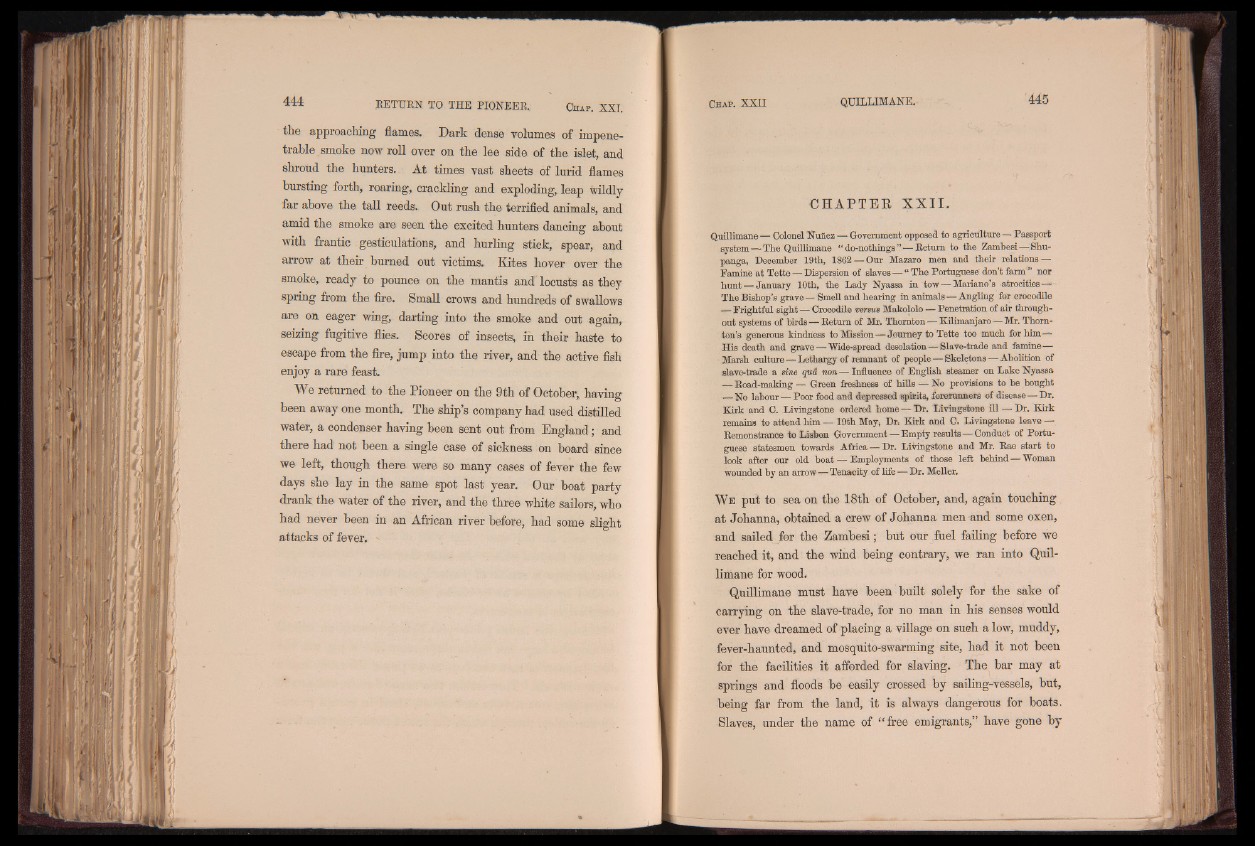
the approaching flames. Dark dense volumes of impenetrable,
smoke now roll oyer on the lee side of the islet, and
shroud the hunters. At times vast sheets of lurid flames
bursting forth, roaring, crackling and exploding, leap wildly
far above the tall reeds. Out rush the terrified animals, and
amid the smoke are seen the excited hunters dancing about
with frantic gesticulations, and hurling stick, spear, and
arrow at their burned out victims. Kites hover over the
smoke, ready to pounce on the mantis and locusts as they
spring from the fire. Small crows and hundreds of swallows
are on eager wing, darting into the smoke and out again,
seizing fugitive flies. Scores of insects, in their haste to
escape from the fire, jump into the river, and the active fish
enjoy a rare feast.
We returned to the Pioneer on the 9th of October, having
been away one month. The ship’s company had used distilled
water, a condenser having been sent out from England; and
there had not been a single case of sickness on board since
we left, though there were so many cases of fever the few
days she lay in the same spot last year. Our boat party
drank the water of the river, and the three white sailors, who
had never been in an African river before, had some slight
attacks of fever, -
C H A P T E R X X I I .
Quillimane — Colonel Nuiiez — Government opposed to agriculture — Passport
system—The Quillimane “ do-nothings” — Betum to the Zambesi—Shu-
panga, December 19th, 1862 — Our Mazaro men and their relations —
Famine at Tette— Dispersion of slaves— “ The Portuguese' don’t farm” nor
hunt — January 10th, the Lady Nyassa in tow — Mariano’s atrocities —-
The Bishop’s grave—Smell and hearing in animals — Angling for crocodile
— Frightful sight— Crocodile verms Makololo — Penetration of air throughout
systems of birds — Betum of Mr. Thornton — Kilimanjaro — Mr. Thornton’s
generous kindness to Mission — Journey to Tette too much for him —
His death and grave—"Wide-spread desolation— Slave-trade and famine—
Marsh culture—Lethargy of remnant of people—Skeletons—Abolition of
slave-trade a sine qua non — Influence of English steamer on Lake Nyassa
— Boad-making — Green freshness of hills — No provisions to be bought
—No labour — Poor food and depressed spirits, forerunners of disease—Dr.
Kirk and G. Livingstone ordered home — Dr. Livingstone Ml—Dr. Kirk
remains to attend him — 19th May, Dr. Kirk and C. Livingstone leave —
Bemonstranoe to Lisbon Government — Empty results — Conduct of Portuguese
statesmen towards Africa — Dr. Livingstone and Mr. Bae start to
look after our old boat — Employments of those left behind p? Woman
wounded by an arrow—Tenacity of life — Dr. Meller.
We put to sea on the 18th of October, and, again touching
at Johanna, obtained a crew of Johanna men and some oxen,
and sailed for the Zambesi; but our fuel failing before we
reached it, and the wind being contrary, we ran into Quillimane
for wood.
Quillimane must have been built solely for the sake of
carrying on the slave-trade, for no man in his senses would
ever have dreamed of placing a village on such a low, muddy,
fever-haunted, and mosquito-swarming site, had it not been
for the facilities it afforded for slaving. The bar may at
springs and floods be easily crossed by sailing-vessels, but,
being far from the land, it is always dangerous for boats,
Slaves, under the name of “ free emigrants,” have gone by